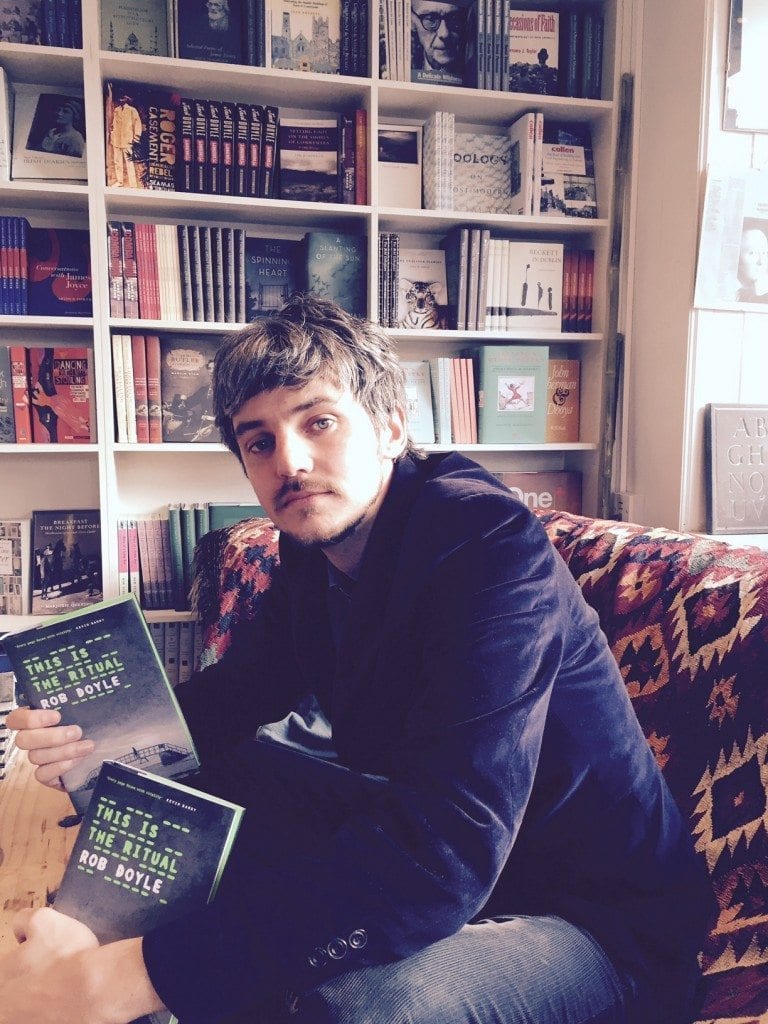5 Questions About Writing: Rob Doyle
Rob Doyle’s latest collection, This is the Ritual, is published by The Lilliput Press and is available in all good bookshops now.
We asked him about his writing.
Q. 1. What do you start with? Do you have the seed of an idea in place when you begin to write? Do you have a much more general notion of what the story might be or is the story more or less clear in your mind from the beginning?
A. I never have any kind of plan, plot or characters when I first start writing a piece of fiction. What I do have, very often, is a place. I’ll start writing to summon up the atmosphere of a particular landscape or city, and then hopefully the rest will follow. This Is the Ritual has stories set all over the world – Mexico, Paris, Barcelona, London, Berlin, Dublin. In many cases, a certain voice will take hold, and from then on, it’s all good. Once the voice is alive, there’s not much to worry about.

Q.2 Chicken or egg? Do you come up with characters or situations first?
A. See above! The voice suggests the character, and usually the situations as well. Take, for instance, my story The Turk Inside. I sat down to write it in a mood of rage, and all I knew was that it was set in London. I could soon see that the voice was working – urgent, frenetic, desperate. The rest followed. What came of it was a story of sexual obsession and raw anguish that pleased and surprised me.
Q.3 Have you ever based a character on someone you knew?
A. Yes, I have done, but not often. My story No Man’s Land features a profoundly troubled man, hopelessly adrift beyond the limits of common human experience. He was based on someone who I like and respect. That is an exception, though, and the person in question has given me permission to write about his disturbing life. In general, I think it’s right to be very careful about exposing real people in your (non-journalistic) writing. It’s tricky ethical terrain; lack of thoughtfulness can lead to an abuse of the power of the writer – the power to have the last word. The person who is most regularly and ruthlessly slandered in my writing is me. I find it more amusing that way. I suppose I have a masochistic streak.
Q.4 Is writing a cathartic process for you? Do you use your work to explore difficulties in your own life or to question situations/relationships, etc.? Or is it more of an abstract ‘what-if’ process?
A. Yes, it is incredibly cathartic. When I was younger I used to play in various punk bands, and the violence and energy of that was a way of keeping myself sane – just about. Nowadays, writing does that. The feeling of relief when you give shape to your experiences in art – especially if these experiences are of a kind that aren’t acknowledged in mainstream, consensual reality – is tremendous. I’ve had the experience a few times of realising that I’ve cured myself of certain obsessions or existential impasses by writing about them. There are other obsessions which continue to haunt me, despite my having written about them. I suppose that’s where writers get their material from: whatever haunts them. I think often of a line from Simone Weil: ‘What is your torment?’
Q.5 Is Anus – Black Sun based on real-life events…?
A. Anus – Black Sun comes from a longstanding, admiring fascination with pornography. Some of the great visionaries of our time are pornographers, and many of them are women. Pornography is a great leveller and a tonic reminder of what we are: sapient meat, slung up on hooks in the butcher-shop of desire.
Stay tuned for more glimpses into the minds of our authors.
Do you have questions you would like answered about a favourite Lilliput book?
